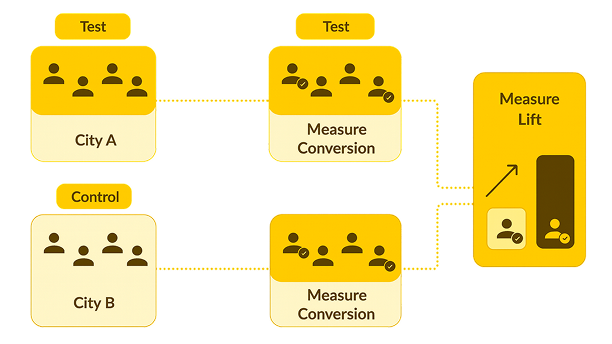Chapter 1: Introduction to MMM

fusepoint’s Growth Academy is your go-to hub for mastering marketing measurement, from testing and modeling to understanding what truly drives growth. Here, you’ll have access to clear, actionable resources designed to help you make smarter marketing choices with confidence.


Learn Smarter.
Measure Smarter.
Grow Smarter.
Matched Market Testing (MMT) measures the real impact of your marketing. It works by comparing test markets, where a campaign runs, to control markets, where it doesn’t. Unlike platform attribution, MMT shows the revenue and conversions your marketing truly drives, helping you optimize spend.


Marketing Mix Modeling (MMM) uses historical data to quantify how each marketing channel contributes to sales and revenue. By analyzing patterns across digital, offline, and retail channels, MMM helps you understand what drives growth and optimize your media mix for maximum impact.









As brands evolve and the marketing landscape becomes more complex, leaders need deeper skills in measurement, experimentation, analytics, and strategic decision-making. The fusepoint Growth Academy was built to close that gap. Below, you’ll find answers to the most common questions about our business strategy courses, who they’re for, what you’ll learn, and how they help teams accelerate growth with clarity and confidence.
Traditional business strategy courses teach frameworks but rarely show you how to apply them in real operating environments. The fusepoint Growth Academy offers practical training rooted in real client work, ranging from media mix modeling (MMM) and matched market testing to customer research, growth modeling, data infrastructure and more.
Instead of textbook concepts, our courses focus on:
Our academy teaches the same strategic frameworks our analysts and consultants use with enterprise, retail, and high-growth brands, giving teams modern strategic management skills, not recycled business school theory.
fusepoint’s training programs are built for anyone responsible for making data-driven strategic decisions, including:
Whether you’re leading strategic planning, building models, or making go-to-market decisions, these courses help you upgrade your strategic thinking with modern measurement and analytics expertise.
Every course is built to strengthen your ability to measure, analyze, and lead. Key skills include:
You’ll walk away with strategic decision-making skills that directly influence budget allocation, growth strategy, and executive-level business planning.
fusepoint’s programs deliver the rigor of executive education, but with a critical difference: every course is built around real, modern marketing and measurement complexity, not traditional case studies.
Where many business schools teach:
fusepoint teaches:
Our business strategy courses are essentially “the modern replacement” for traditional business school strategy programs, faster, more actionable, and focused on solving the problems companies actually face today.
These courses provide professionals with a competitive edge in roles where strategic thinking, analytics, and measurement are becoming increasingly mandatory. Learners gain skills that directly support career growth in:
Operations and revenue leadership
Yes. Every course is designed around practical application, not passive learning:
You’re not just learning a strategy, you’re building the systems that enable it.
Courses span the full spectrum of modern strategy, including:
This combination makes the academy uniquely suited for business leaders who need to think strategically and make decisions with scientific rigor.
The academy is designed to improve decision-making across the entire business. Companies benefit through:
Brands that complete our programs often see faster growth, increased profitability, and more confident leadership teams, because strategy becomes a repeatable, data-driven discipline, not a guessing exercise.